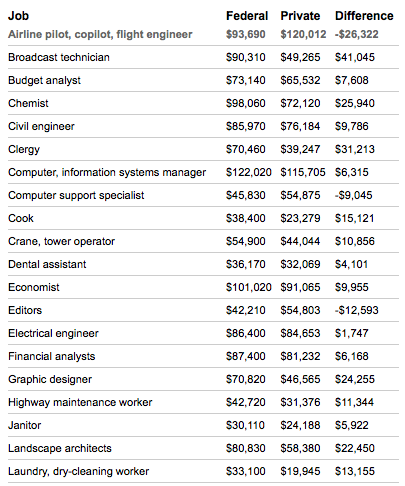No, it’s not the evil banks, the evil insurance companies, the evil oil companies, or even the evil manufacturing sector (take it as read that most media types think every corporation is, by definition, evil). No, in this case the reports are starting to identify the real culprit: the civil service. Mark Steyn summarizes handily:
They were not an “anti-government” mob, but a government mob, a mob comprised largely of civil servants. That they are highly uncivil and disinclined to serve should come as no surprise: they’re paid more and they retire earlier, and that’s how they want to keep it. So they’re objecting to austerity measures that would end, for example, the tradition of 14 monthly paycheques per annum. You read that right: the Greek public sector cannot be bound by anything so humdrum as temporal reality. So, when it was mooted that the “workers” might henceforth receive a mere 12 monthly paycheques per annum, they rioted. Their hapless victims — a man and two women — were a trio of clerks trapped in a bank when the mob set it alight and then obstructed emergency crews attempting to rescue them.
Unlovely as they are, the Greek rioters are the logical end point of the advanced social democratic state: not an oppressed underclass, but a pampered overclass, rioting in defence of its privileges and insisting on more subsidy, more benefits, more featherbedding, more government.
We’ve already seen that employees in the public sector have been outpacing their private sector equivalents handsomely, but the Greek civil service has it even better than most:
Greek public sector employees are entitled not only to 14 monthly paycheques per annum during their “working” lives, but also 14 monthly retirement cheques per annum till death.
Nice. I wonder how they got into that interesting arrangement? No matter, the private sector will ride to the rescue, right? Not likely:
According to the World Bank, when it comes to the ease of doing business, Greece ranks 109th out of 183 countries. If they were dramatically to liberate their business-killing economy, they might overtake Lebanon at big hit position 108, and Ethiopia at 107, and maybe Papua New Guinea at 102. And who knows? With even more radical reform, they might crack the Hot One Hundred and be bubbling under such favourable business environments as Yemen (99) and Moldova (94). Greece ranks 140th when it comes to starting a business, and 154th when it comes to protecting investors.
If it’s that difficult to start a new business, is it any wonder that so much of the Greek economy is in the underground/unreported/untaxed sector? Many media reports say that anywhere from 10% to 25% of Greek economic activity is “off the books”. A quick Google search will show a much higher range of estimates going up to 60% . . . and that might be an optimistic under-estimate.
If more than half of the nation’s economic activity is in the black market, it will take much more than adding a few auditors and inspectors to the tax department to fix the problem: an absolute majority of Greeks are actively hiding their business from the government, and any serious attempt to crack down on them will bring down the government. And that’s not even the biggest danger — the Greek government isn’t the most stable entity to start with. The government falling might be a safety valve, because the other alternative is literally revolution.
Talk about your destabilization!




